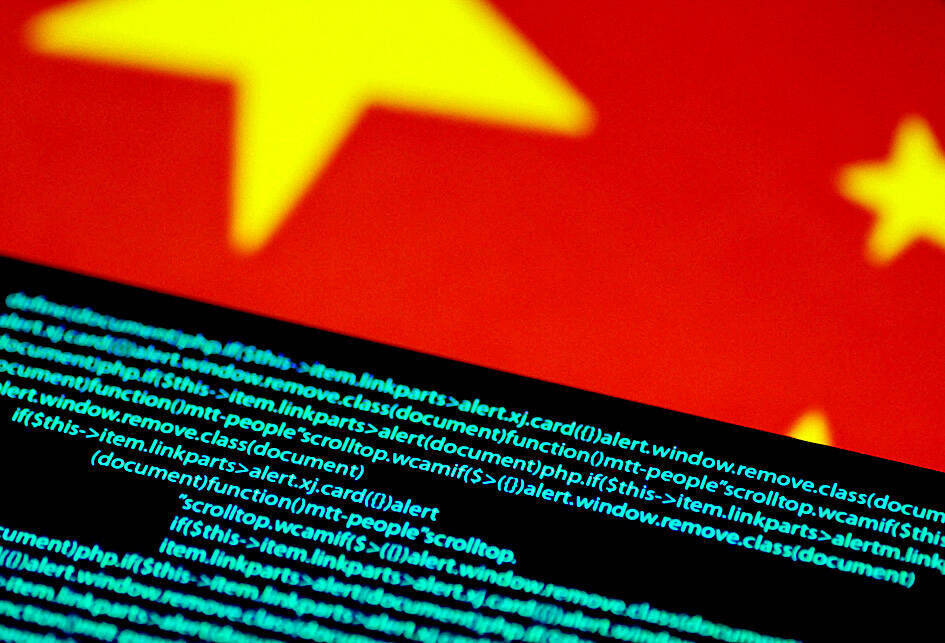The High Court’s Kaohsiung branch in a second ruling on Thursday upheld a lower court’s decision, finding Chinese immigrant Tsai Zhan-ping (蔡占萍) not guilty of contravening the Anti-Infiltration Act (反滲透法) by funding borough wardens to visit China in 2023.
Tsai moved from Jiangsu Province to Taiwan after marrying a Taiwanese 20 years ago. She is chair of the Greater Kaohsiung Cross-Strait Cultural and Economic Exchange Promotion Association.
Kaohsiung district prosecutors in December 2023 detained Tsai on suspicion of organizing a group tour to China for 30 borough wardens in exchange for their support for pro-China candidates in an election.

Photo: Reuters
Prosecutors said that Beijing had funded all the expenses of Tsai’s group except the airfares in a bid to secure the cooperation of borough wardens in China’s election meddling.
They presented Tsai’s political comments in the group tour’s Line chat room after her return to Taiwan and the financial records of the trip as circumstantial evidence of a quid pro quo exchange.
The Kaohsiung District Court in the first ruling in February found Tsai not guilty, citing insufficient evidence to substantiate the charges.
Tsai made political posts on Line a month following the trip, which weakened the correlation between the group’s visit to China and political activities, the court said.
Prosecutors did not prove beyond reasonable doubt that the wardens had paid for their dining and accommodation expenses with money from the Chinese government, it said.
The High Court’s Kaohsiung branch maintained the lower court’s decision, although the ruling can still be appealed.
Mainland Affairs Council Deputy Minister Liang Wen-chieh (梁文傑) expressed disappointment at the court’s decision.
The council hopes the public would continue to support prosecutors and police who handle the difficult task of investigating Chinese election meddling, he said.
Judges apply a high level of scrutiny to criminal offenses, including breaches of the Anti-Infiltration Act and the Public Officials Election and Recall Act (公職人員選舉罷免法), said Lo Cheng-chung (羅承宗), a law professor at the National Kaohsiung University of Science and Technology.
Securing a conviction without definitive evidence is exceedingly difficult, Lo said, adding that precedent suggests the courts are inclined to give light sentences when they find the defendants guilty.
Establishing a national security court would not help prosecutors win cases if they do not have strong evidence, and espionage and foreign influence cases rarely leave a trail for investigators to follow, he said.
Police and prosecutors cannot access China-based banking records or digital platform transactions, making national security cases difficult for prosecutors to bring to trial, he added.
Taiwan’s national security apparatus should consider making better use of the executive branch’s powers to prevent dangerous contact between Taiwanese and Chinese officials, instead of relying on the courts, Lo said.
Also on Thursday, Taipei district prosecutors decided not to indict seven borough wardens in Taipei’s Songshan District (松山) on charges related to suspicions that Beijing had funded trips to Shanghai to obtain support for pro-China candidates in the election.
Investigators did not find enough evidence of alleged electoral fraud to build a case, the prosecutors’ office said in a statement.

Taiwan has received more than US$70 million in royalties as of the end of last year from developing the F-16V jet as countries worldwide purchase or upgrade to this popular model, government and military officials said on Saturday. Taiwan funded the development of the F-16V jet and ended up the sole investor as other countries withdrew from the program. Now the F-16V is increasingly popular and countries must pay Taiwan a percentage in royalties when they purchase new F-16V aircraft or upgrade older F-16 models. The next five years are expected to be the peak for these royalties, with Taiwan potentially earning

POSITIVE DEVELOPMENT: Japan and the US are expected to hold in-depth discussions on Taiwan-related issues during the meeting next month, Japanese sources said The holding of a Japan-US leaders’ meeting ahead of US President Donald Trump’s visit to China is positive news for Taiwan, former Japan-Taiwan Exchange Association representative Hiroyasu Izumi said yesterday. After the Liberal Democratic Party’s landslide victory in Japan’s House of Representatives election, Japanese Prime Minister Sanae Takaichi is scheduled to visit the US next month, where she is to meet with Trump ahead of the US president’s planned visit to China from March 31 to April 2 for a meeting with Chinese President Xi Jinping (習近平). Japan and the US are expected to hold in-depth discussions on Taiwan-related issues during the

‘LIKE-MINDED PARTNER’: Tako van Popta said it would be inappropriate to delay signing the deal with Taiwan because of China, adding he would promote the issue Canadian senators have stressed Taiwan’s importance for international trade and expressed enthusiasm for ensuring the Taiwan-Canada trade cooperation framework agreement is implemented this year. Representative to Canada Harry Tseng (曾厚仁) in an interview with the Central News Agency (CNA) said he was increasingly uneasy about Ottawa’s delays in signing the agreement, especially as Ottawa has warmed toward Beijing. There are “no negotiations left. Not only [is it] initialed, we have three versions of the text ready: English, French and Mandarin,” Tseng said. “That tells you how close we are to the final signature.” Tseng said that he hoped Canadian Prime Minister Mark Carney

STAY IN YOUR LANE: As the US and Israel attack Iran, the ministry has warned China not to overstep by including Taiwanese citizens in its evacuation orders The Ministry of Foreign Affairs (MOFA) yesterday rebuked a statement by China’s embassy in Israel that it would evacuate Taiwanese holders of Chinese travel documents from Israel amid the latter’s escalating conflict with Iran. Tensions have risen across the Middle East in the wake of US and Israeli airstrikes on Iran beginning Saturday. China subsequently issued an evacuation notice for its citizens. In a news release, the Chinese embassy in Israel said holders of “Taiwan compatriot permits (台胞證)” issued to Taiwanese nationals by Chinese authorities for travel to China — could register for evacuation to Egypt. In Taipei, the ministry yesterday said Taiwan